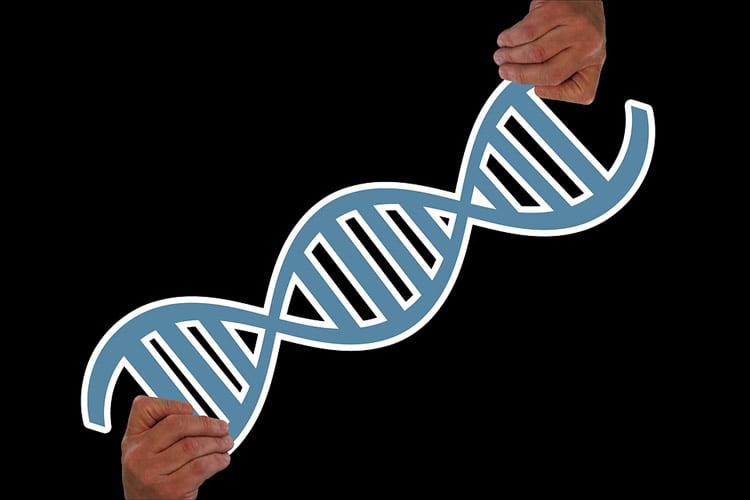Summary: People with the specific genotype of the Cannabinoid receptor 1 gene may be more prone to cannabis use disorder. Researchers report those with FAAH rs324420 A continue to want more marijuana following use and are more drawn to cannabis-related imagery while under the influence of the drug.
Source: UCL
Some people may be more genetically prone to cannabis addiction, finds a new UCL-led study.
The researchers say their investigation of three genetic markers, published in Addiction Biology, could inform why some people become dependent on cannabis.
“We were interested in asking whether these genetic markers could predict addiction-related responses after inhaling doses of cannabis, such as how much our attention is drawn to cannabis-related pictures,” said lead researcher Dr Chandni Hindocha (UCL Clinical Psychopharmacology Unit).
The researchers were investigating three different markers of genetic variation which have previously been implicated in cannabis addiction but have not all been considered in the same study before. The variants are involved in the body’s endocannabinoid system.
For the study, 48 cannabis users took cannabis using a vaporiser, and conducted tests related to addiction predisposition: a test for drug cue salience (which means how attention-grabbing cannabis-related images were versus neutral images, such as side-by-side images of a woman smoking cannabis and a woman holding a pen near her mouth); a satiety measure (testing whether they still want more cannabis after they’ve already had some) and a craving measure. They were also tested for the three genetic markers.

The researchers chose to focus on the specific cognitive mechanisms involved in addiction, rather than a general measure of cannabis dependency, to get a more detailed picture of how genetic markers affect the brain mechanisms that contribute to long-term drug dependency.
The researchers found differences to drug cue salience and state satiety for all three genetic variants. One genotype in particular, regarding the Cannabinoid receptor 1 gene, was associated with people continuing to want more cannabis after having used it, and continuing to be more drawn to cannabis-related imagery while under the influence.
The researchers say this suggests that people with that genetic marker could be more prone to cannabis addiction, especially as THC, the psychoactive component in cannabis, binds to this receptor.
The researchers say that it’s easy to test for these genetic variants, but that more research is needed to optimise such a test.
“There’s still more work to be done to clarify how these genetic variants impact drug effects, and to identify what other factors should be considered to gauge how vulnerable someone is to cannabis addiction.”
“With time, we hope that our results could pave the way towards more personalised approaches to medicinal cannabis prescription,” said the study’s senior author Professor Val Curran (UCL Clinical Psychopharmacology Unit).
Dr Hindocha said: “We hope that our findings could lead to the development of a test that could inform clinicians who are considering prescribing a cannabis-derived medication, as we learn more about which genes affect how people react to cannabis,”
Co-author Dr Tom Freeman (University of Bath) added: “Our findings have the potential to inform precision medicine targeting the rising clinical need for treatment of cannabis use disorders.”
Funding: The study was conducted by researchers at UCL, University of Bath, King’s College London, and the University of Exeter, and funded by the MRC alongside support from the National Institute for Health Research UCLH Biomedical Research Centre.
Source:
UCL
Media Contacts:
Tash Payne – UCL
Image Source:
The image is in the public domain.
Original Research: Closed access.
“Acute effects of cannabinoids on addiction endophenotypes are moderated by genes encoding the CB1 receptor and FAAH enzyme”
Chandni Hindocha, Tom P. Freeman, Grainne Schafer, Chelsea Gardner, Michael A.P. Bloomfield, Elvira Bramon, Celia J.A. Morgan, H. Valerie Curran. Addiction Biology. doi:10.1111/adb.12762
Abstract
Acute effects of cannabinoids on addiction endophenotypes are moderated by genes encoding the CB1 receptor and FAAH enzyme
Understanding genetic factors that contribute to cannabis use disorder (CUD) is important, but to date, findings have been equivocal. Single‐nucleotide polymorphisms (SNPs) in the cannabinoid receptor 1 gene (CNR1; rs1049353 and rs806378) and fatty acid amide hydrolase (FAAH) gene (rs324420) have been implicated in CUD. Their relationship to addiction endophenotypes such as cannabis‐related state satiety, the salience of appetitive cues, and craving after acute cannabinoid administration has not been investigated. Forty‐eight cannabis users participated in a double‐blind, placebo‐controlled, four‐way crossover experiment where they were administered treatments in a randomized order via vaporization: placebo, Δ9‐tetrahydrocannabinol (THC) (8 mg), THC + cannabidiol (THC + CBD) (8 + 16 mg), and CBD (16 mg). Cannabis‐related state satiety, appetitive cue salience (cannabis and food), and cannabis craving were assessed each day. Participants were genotyped for rs1049353, rs806378, and rs324420. Results indicated that CNR1 rs1049353 GG carriers showed increased state satiety after THC/THC + CBD administration in comparison with placebo and reduced the salience of appetitive cues after THC in comparison with CBD administration; A carriers did not vary on either of these measures indicative of a vulnerability to CUD. CNR1 rs806378 CC carriers showed greater salience to appetitive cues in comparison with T carriers, but there was no evidence for changes in state satiety. FAAH rs324420 A carriers showed greater bias to appetitive cues after THC, in comparison with CC carriers. FAAH CC carriers showed reduced bias after THC in comparison with CBD. No SNPs modulated craving. These findings identify candidate neurocognitive mechanisms through which endocannabinoid system genetics may influence vulnerability to CUD.







